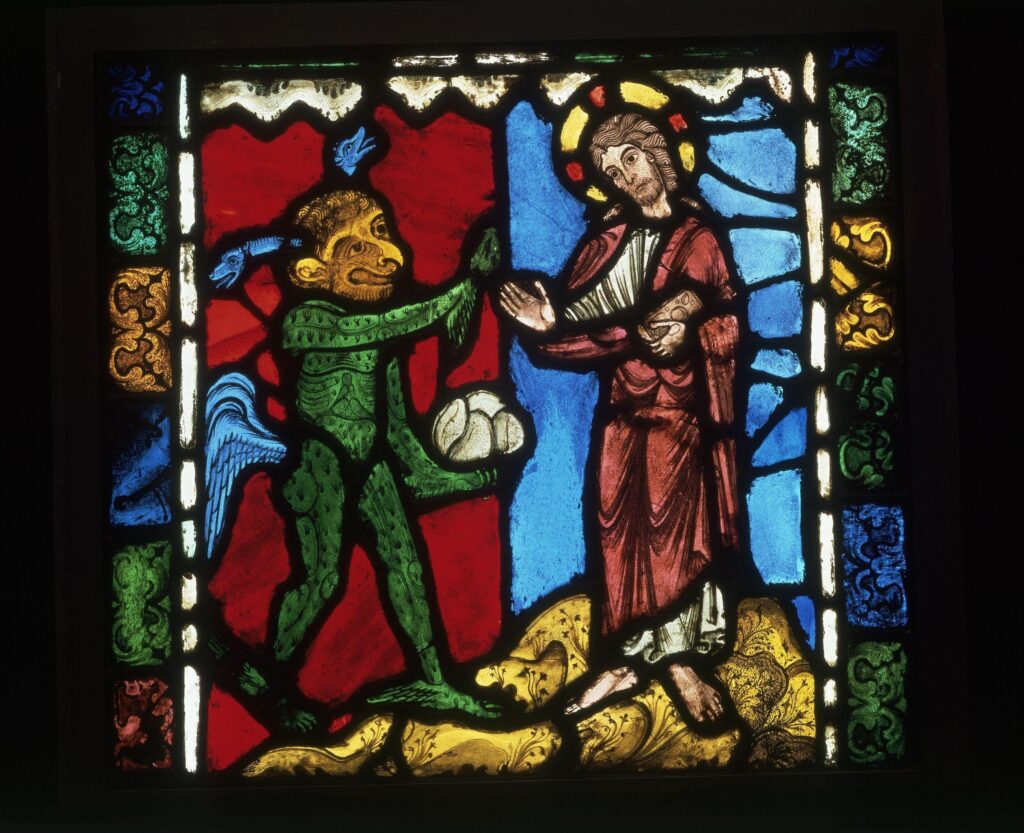
(Image: Temptation in the Wilderness, stained glass ca 1200, France, © the Victoria and Albert Museum, London)
What is Lent?
Lent is the 40 day period before Easter, excluding Sundays, beginning on Ash Wednesday, and ending on the evening of Maundy Thursday, making way for the celebration of the ‘Triduum’, the three most important days in the Church’s year: Maundy Thursday, Good Friday and Easter.
In the scriptures, forty days is a traditional period of time for discipline, devotion and preparation, as we see, for instance, in the Gospels when Jesus goes into the wilderness to prepare for his ministry.
So, what can we do this Lent?
Worship: why not consider going to a weekday Mass? Holy Trinity has regular weekday Masses for you to join in. Lent may be a time for you to take worship a little more seriously during your working week:
Private prayer: Our prayer lives can be very haphazard and undisciplined. Lent has traditionally been a time to correct this. Churches are open for you to pop in and take a deep breath of prayer. Maybe you prefer to try and pray at home, setting aside a few minutes each day to bring yourself consciously into the presence of God. This can be a very difficult thing to do if we are wound up, distracted and stressed. We may need to light a candle, play some music or breathe slowly before we can either pray in silence or in words. For the Christian, nothing is more important than our relationship with God because it affects all our other relationships, choices and behaviour. All loving relationships need time spend on them, time that can often feel as if it’s being wasted. Our relationship with God is no different. What should you do about this in Lent?
Giving up: Most people think that Lent is about giving something up and it can often be a good idea to see whether you are able to give a few things up. What are you addicted to (can you answer that question?!) and what does this say about you? If you give up alcohol or chocolate, you might also think about giving the money you would normally spend on them to a charity. Wherever possible, try and make your giving up beneficial to someone else other than you.
Taking on: Some people prefer to take things on rather than give something up. This can range from taking more care of yourself (by taking exercise, for example) to making sure that you do something more profitable than watching TV one night a week. One might consider helping out as a volunteer somewhere or deciding to visit someone who is lonely or not well. You could decide to be more envirnomentally friendly and change some bad habits. Christians need to take much more seriously their belief that God has entrusted his creation to us, and that to exploit and spoil this world and its environment is sinful. Perhaps you might consider sponsoring a child through a charitable organisation? Lent is a time in which to redeem your time rather than waste it!
Money: As we know, a good way of taking a look at our values is to take a look at our bank statement and see where we spend our money. Most of us can easily be a little more generous towards those who are less fortunate or to some charity that needs help. What about considering giving the weekly money that you would normally spend on a magazine, the cinema, cigarettes, beer, another meal out, to a charity that helps those who cannot afford such luxuries? Although many people think that all Christians can get worked up about is sex, actually the thing that Jesus talks about and warns people about much more is their attitude towards their belongings and money. What we possess can quickly possess us. Is it time to review your giving to the Church or to be more responsible in the way you give it? How much does your church mean to you?
